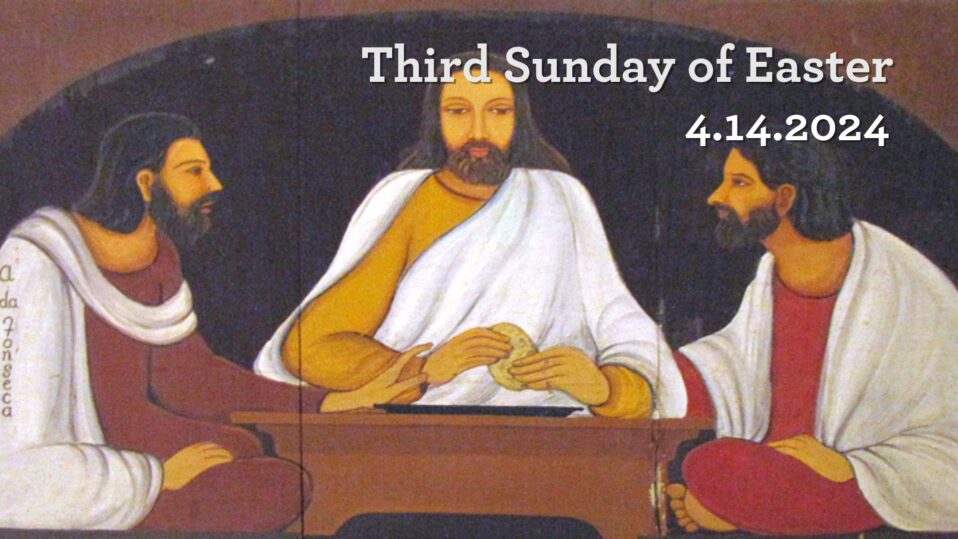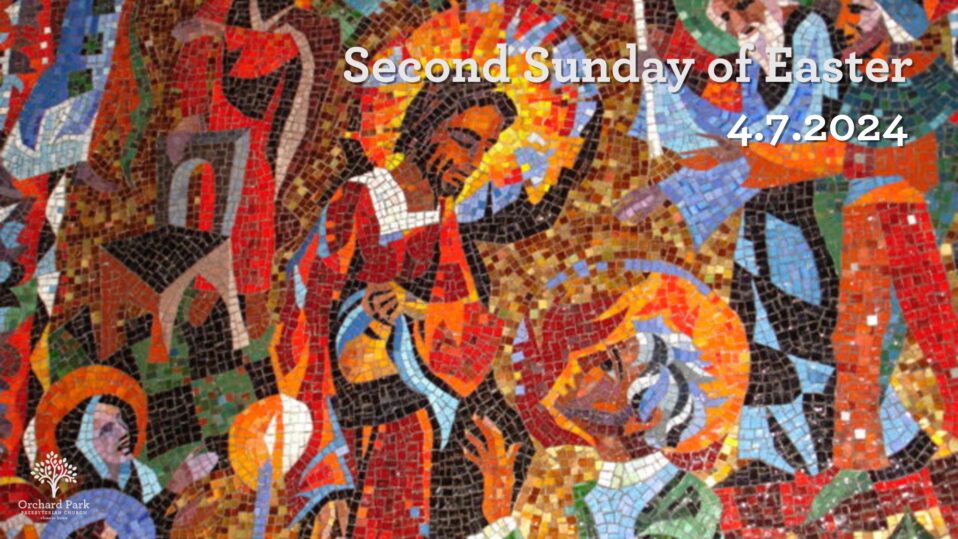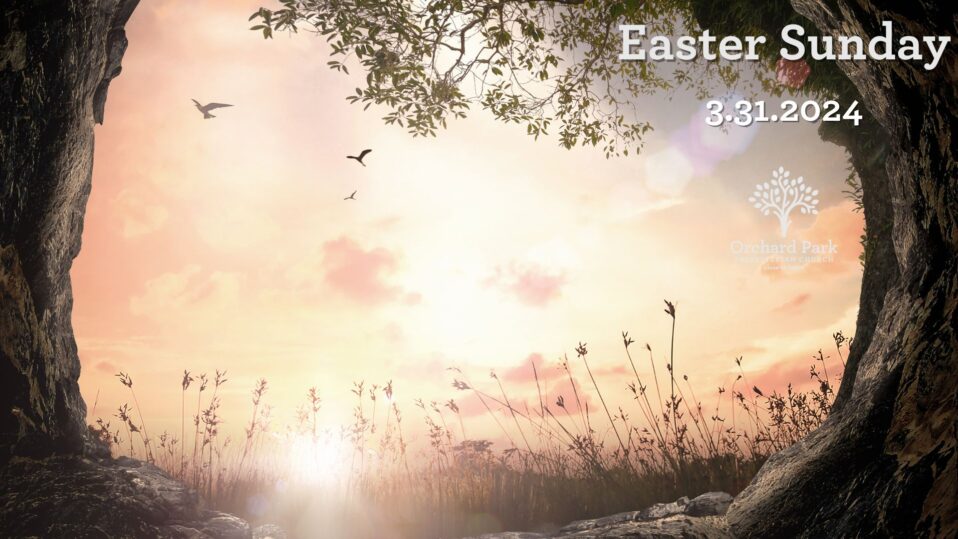April 9, 2023
Matthew 28: 1-10
EASTER SUNDAY
He is risen!
He is risen, indeed.
How remarkable and profound that for thousands of years, Christians have come to this story miraculous story as the corner stone of their faith and the motivation for how we are to live and be. We believe we are an Easter people. Every Sunday is a little Easter, every Sunday we get the opportunity to remember that the cross stands empty, that through the cross we are forgiven, and that Jesus lives.
As someone who is always standing here every Sunday, proclaiming that hope, that Good News, I confess I forget that for many in our society, this message is only heard one Sunday a year, or not at all. If you are here today not because of the tradition of Easter and you like the beauty of the day and the holiday and the tradition, we welcome you. If you aren’t sure about all of this religion stuff, and aren’t sure you need the ritual of worship or know the community of the church, to grow in your faith, we welcome you. If you have been hurt by the church, if the doctrine, dogma and duty of the church has denied you and your true self, we recognize your bravery in being here and we welcome you.
You see Easter Sunday is not about the aesthetics. You could take away all of the flowers and the music and you would still have Easter. Easter is an experience that is completely out of our control. Easter is about living a faithful life that you may know joy.
Let’s begin with the end.
The trial is over. Suffering is over. Death is ended. The tomb has been closed. That’s the end of the story. The end. Roll credits. “It’s like in the great stories, Mr. Frodo. The ones that really mattered. Full of darkness and danger they were. And sometimes you didn’t want to know the end… because how could the end be happy?”
Nobody’s life story is without regret, or loss, or suffering. Everyone eventually finds ourselves sitting in limbic state thinking, “what the hell just happened?” You might feel fear grief, anger, loss, discouragement, all of the things I imagine the disciples felt on that holy Saturday.
And it is here at the end, when all is lost, that the story begins.
In that state of deep sadness, the women encounter two angels who say, be not afraid.
The first thing the angel says is, “Be not afraid.” Remember I said Easter was about living a faithful life that you may experience joy? First lesson of the Gospel: be not afraid.
Don’t be afraid. Are you afraid, right now?
Are you afraid of the economy?
Are you afraid of the government?
Are you afraid of violence?
Are you afraid of the future?
Are you afraid of what you might lose or what has been lost?
These are all of the things the disciples were afraid of too. Over and over again in the Gospel through various messengers God commands do not be afraid. That does not mean do not mean naïve or have blind trust. Not it means don’t let fear paralyze you from moving forward. The next thing they say is come and see.
The second less of the Gospel: Come and See.
Come see this place where a body once lay. Come see this place where it ended, so you can begin.
To obtain joy, we have to go to forsaken places, knowing those places aren’t the whole story, but knowing also that those are the places where resurrection comes from. We must bear witness to the sick bed, the ghetto, the homeless, the abused and the grieving. You cannot escape this part of the story. You have to go to the tomb yourself and see. See that healing does happen, that stomachs can be filled, that homes can be rebuilt.
When I was in college everyone was afraid of contracting the HIV virus that would result in AIDS. People were afraid they were going to get it and they were afraid of people who had it. I was part of the Newman Catholic Center on campus and we wrote a play educating people on HIV and Aids and part of our research was we visited and had dinner with people who had the disease. It was a profoundly simple and prophetic thing to eat with someone who had a disease we all feared. We left that dinner humbled and inspired, and no longer afraid.
After the women see that the tomb, the thing the dreaded, was empty, the angels say, “Go quickly and tell his disciples.” The second lesson: Go and tell. In other words, this event, this experience, this faith isn’t just about you. The discipline of joy means not just reflecting on your own happiness, your own sense of certainty and exhilaration and clarity, but about a community experience, about a sharing and walking together and discovering from one another.
And then this beautiful moment occurs when Jesus appears in front of them and they run to his feet with profound joy, because he came back. You know every September there is a lot of crying here at Orchard Park. Our learning center is filled with 2 year olds and 3 year olds and many of them are so scared and sad. There is a little litany that takes place. The children are afraid, the parents say, don’t worry, I will come back, and low and behold in a few hours, the parents return, we actually have a very high return rate of parents coming back to get their children, and the children are overjoyed to see their parents. Twelve years later, the child leaves in a car and promises be out until curfew and the parent waits and waits and watches the clock and is overjoyed when they hear the garage door come up. The fourth lesson: the love of Jesus always comes back.
Easter is the love of God come back to us. Even when we try to push Jesus away, he comes back. It’s what love does. But there is more. The resurrection of Jesus Christ means there is life after death. But resurrection means more than that. Resurrection means that the way of Jesus is true. It means that to live like Jesus is to be fully human. It means that sins are forgiven and life is made whole. But if that is true, then there is no doubt that Easter isn’t over.
Lastly the angel says, “He is going ahead of you to Galilee; there you will see him.”
We need to understand this.
It’s not that Jesus has retired to a nice coffee shop where he can catch up with his disciples. Galilee is the place of ministry. Galilee is where Jesus taught and where he pushed back evil. It is where he healed that which was broken and where he forgave that which we cannot fix. Why is this important? Because that is where we see the love of God alive in this world. Resurrection is not just about life after we die; resurrection is the battle God wages to repair and heal and redeem that which we cannot make right in this world. Preacher Tom Are asks,
“Where do we point to resurrection in our day – in these days when democracy is attached, in these days when Putin is resurrecting nuclear threats, in these days when community after community is forced to rebuild as another flood, fire, or storm of the century leaves neighborhoods and sometimes whole communities wiped off the map, in these days when folks who identify themselves as followers of Jesus diminish the humanity of their neighbor, speaking of them not as human beings but as a ‘political agenda’? In days such as these, the lordship of Jesus Christ is seldom obvious. However, we should not lose perspective. There have been better days, for sure. There have also been worse days, and the gospel pen is in our hands…. So what do we say?”
The fifth and final lesson: What will our story of the resurrection be?
To be a Christian means to believe in something you didn’t make happen and you can’t make happen, but you believe will happen, and does happen through a power beyond our control and understanding. To be a Christian means to pray thy kingdom come, thy will be done and want it to be so and make it so. To be a Christian is to hold the tension of facing a broken and fearful world and running out the door with abandoned hope and shouting death has lost its sting, crying and pain shall be no more, he is alive, he is risen. To be a Christian is to be terrified and joyful at the same time. Terrified because it takes courage Go forth into the world in peace.
Be of good courage.
Hold fast to that which is good.
Render to no one evil for evil.
Strengthen the fainthearted.
Support the weak.
Help the afflicted.
Show love to everyone.
And joyful because we know Jesus has conquered sin and passed through his own pain to the glory of the Resurrection. Joyful because if you have lost faith in yourself, He hasn’t. If you’ve lost faith in people, He hasn’t. If you’ve lost confidence in the future, He hasn’t. Jesus never lost faith in people. He never despaired of human nature, nor in the future, nor in the triumph of his cause, not even at the cross.”
He is risen. He is risen indeed.
Amen,
Rev. Dr. Shelly Wood



